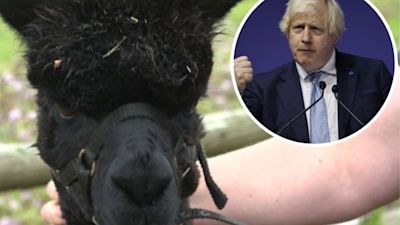Owner of alpaca sentenced to die calls for Prime Minister to intervene

Watch Alex Wood's report
The owner of an alpaca that has been sentenced to die by a High Court judge has appealed to the Prime Minister for a last minute intervention.
Helen Macdonald has urged Boris Johnson to reverse the decision to put Geronimo down before this Thursday’s (August 5) deadline.
She has been campaigning on behalf of the animal since 2017, when he tested positive for bovine tuberculosis (TB).
Helen disputes the result and maintains her animal - which has lived in quarantine on her farm in Wickwar, South Gloucestershire, ever since - is perfectly healthy.
But she lost an appeal in the High Court last week, meaning Geronimo must now be put down.
“TB is a progressive wasting disease and in alpacas, they typically die within a year,” Helen explained.
“They cough, they splutter, they get pneumonia-like symptoms, they lay down and die.
“They said he might have caught it at a show in New Zealand, which would have been 2015, and he’s still here four years later.
‘I’d like Boris Johnson to intervene’
Helen said the only possible solution for Geronimo would be an intervention from Mr Johnson, though she accepts this is unlikely.
She added: “I’d like Boris Johnson to intervene now and look at this case, look at the evidence and sort out his Government because people’s lives are at stake, animals lives are at stake and we’re not going to get rid of the endemic disease in this country if people aren’t all working together.”
A Defra spokesperson said they sympathised with Ms Macdonald, and described TB as a “terrible disease”.
“It is for this reason that the testing results and options for Geronimo have been very carefully considered by Defra, the Animal and Plant Health Agency and its veterinary experts, as well as passing several stages of thorough legal scrutiny,” the spokesperson said.
“Bovine TB causes devastation and distress for farmers and rural communities and that is why we need to do everything we can to reduce the risk of the disease spreading.”